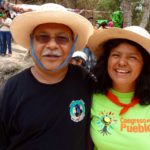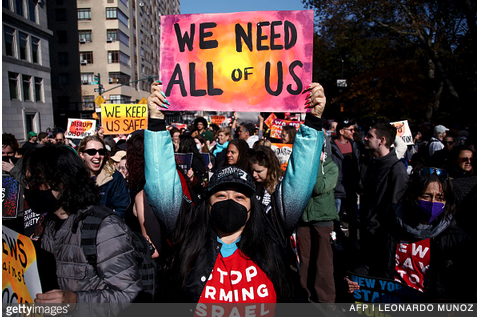A special note here, before reading the main article:
Please join #Hunger4Justice, Dot Fisher, and many other people you know to be at the rally and support the fasters.
who are calling on the U.S. government to release, reunify, apologize, and make amends to all immigrant families kidnapped by ICE.
Wednesday, August 22 – Friday 24
10am – 8PM
Triangle Park, Siskiyou Blvd and Liberty St.
Schedule of events and full information here.
 Jim Phillips, Ph.D. has been visiting, research, and writing about Central America since 1974.
Jim Phillips, Ph.D. has been visiting, research, and writing about Central America since 1974.Creating the conditions that force people to leave:
- Central Americans now form the bulk of the asylum seekers at the U.S. southern border. Hondurans are a large part of that population.
- The majority of Hondurans who seek immigration or asylum in the U.S. are quite poor. Their poverty makes them especially vulnerable to violence of all kinds.
- Since the 2009 coup, Honduras has continued to have one of the highest murder rates in the world, and it currently has the highest rate of femicide (murder of women) in the world.
- Since the 2009 coup, Honduras has displaced Haiti and Nicaragua to become the poorest country in the Western Hemisphere.
- 60% of Hondurans live in poverty, 40% in extreme poverty, according to international financial institutions.
- The Honduran economy is based on a development model forced upon it since about 1990 by the U.S. government and corporations and the Honduran elite.
- This model of development depends on extractive industries for much of its income — especially mining, logging, export agro-industry (sugar, palm oil, etc.), and tourism. We in the U.S., Canada, etc. benefit from this when we buy certain food products, use cell phones (metals mined in Honduras), etc.
- These extractive activities forcibly displace thousands of rural Hondurans who are forced to seek scarce work in the cities where their kids join gangs or face gang violence.
- Gangs in Honduras control entire neighborhoods with violence and threats. They especially target young women and teenage males.
- If your teenage son refuses to join or to work for a gang, he is likely to be killed or tortured, and his family also targeted. If he joins, he may be killed by a rival gang or the police.
- The major Honduran gang networks–Mara 13 and 18th. Street–are a product of the U.S. They began in the U.S. and when we exported gang members to Central America en masse, they got rooted in Honduras and El Salvador, where they feed on the poverty and police corruption.
- The Honduran National Police force is riddled with corruption and collusion with gangs and drug traffickers. Police also conduct their own criminal enterprises. Even the authorities acknowledge this. Going to the police to report a crime or for protection is risky. They may victimize you themselves or tell the perpetrator who will take vengeance on you.
- The police, military, the security forces receive millions of dollars in aid from the U.S. annually. Much of this goes to buy things like teargas and bullets that the security forces use to repress peaceful demonstrations, to evict peasants from their lands at the service of the wealthy, etc. For example, at a peaceful public protest in January after the dubious re-election of the incumbent President, the military police were using tear gas canisters made in Pennsylvania, which they threw at the crowds and then into the houses of suspected protest leaders.
- Corruption and threats make the Honduran judicial system almost non-functional, so poor people cannot find justice or protection from the courts or the police.
- With gang violence, a police force that is part of the problem, and no help from the courts, we can understand why so many Honduran youth and young women with children seek asylum in the U.S.We should remember this when we hear people criticize Central American parents for “allowing” their children to flee to the U.S.
- Mexico is know to be almost as dangerous as Honduras among these exiles, and Mexico now is highly efficient in deporting Central Americans back to Central America–another policy of the U.S. called Plan Frontera Sur, urging/pushing Mexico to deport as many as possible.
- The Honduran government and the U.S. have programs that are supposed to deal with these problems, but Honduran human rights leaders and many people see little or no change in their everyday lives. The governments are doing a lot of public relations and face-saving, but the reality is different
The current immigration flow and processing system is quite lucrative–making money on the miseries of the immigrants:
- Honduran immigrants (both documented and undocumented) send back money (remittances) to Honduras. In 2017, Hondurans in the U.S. sent a total of about $US 4 billion to Honduras. These remittances are the largest single source of income for the Honduran economy, larger than the extractive industries, etc. So creating asylum seekers and refugees is lucrative business for both the Honduran and the U.S. economies, which is a big reason why this system is not likely to change quickly.
- Much of that 4 billion does not get to the families in Honduras for which it was intended. The Honduran government siphons off a lot of it when it arrives as dollars.
- The “guides” that are supposed to help undocumented immigrants get to the U.S. charge thousands, and the drug traffickers and other criminal enterprises use the flows of immigrants to hide their own activities or to force immigrants to carry drugs, etc., for them. Aside from the terror this causes immigrants themselves, it also feeds the wild accusations of our Administration that the immigrants themselves are all drug dealers and gangsters.
- Desperate families raise money for the guides (coyotes) by selling whatever they have, getting help from friends or relatives in the U.S. etc. Some also agree to work for the coyote as they journey north, which is often a bargain with the devil. Lives are worth more than anything. This means that if/when they get deported back to their home countries, they have nothing to go back to — except maybe debt. Still, from their perspective the risk is worth it to save a life.
- U.S. gets cheap labor from undocumented immigrants who are a “docile” workforce that cannot agitate or join unions because of their status. So they can be easily exploited.
- The U.S. government contracts with several private “corrections” corporations that run private prisons, to “detain” immigrants and asylum seekers awaiting deportation or hearings. The corporations currently get $165 per day for each detainee, and there must always be more than 35,000 in detention to fulfill the contract. So there is strong financial incentive to fill and keep full the detention centers. Some have likened this to slavery–making money on the bodies (and misery) of the immigrants.
- At present, there are are more than 700,000 people awaiting asylum hearings before immigration judges in the U.S., but only about 330 immigration judges in the entire country. People seeking asylum must wait for months or years, and many of them remain in detention during that time.
- The pressure on immigration judges is enormous, and the Attorney General now wants to force judges to speed up the process, further endangering the ability of judges to guarantee fair hearings. Instead of training and hiring more judges, U.S. Administrations (past and present) have enlarged the enforcement capability but not the judicial capability to hear cases. By U.S. and international law, asylum seekers have a legal right to a fair hearing.
- The apparent desire to deport as many immigrants as possible seems to undermine some of this lucrative scheme–until we realize that as long as we keep conditions in Central America as they are, a large flow of desperate people will continue to come, many of them for the second or third try because they cannot survive in their homelands.
- Circular immigration–people try multiple times to enter the U.S. because they cannot survive in their home countries–this is very real. Walls and brutal policies won’t dissuade them because in their experience the alternative is worse.
- So the U.S. has a lot of responsibility for promoting an economic model in Honduras that creates poverty and insecurity for many; for introducing gangs into the country; and for supporting and helping to supply (and train at the School of the Americas) security forces that represses its own people in order to allow the extractive economy to continue for our benefit. And the system enriches some people at the expense of others’
- And now we can expect an influx from Nicaragua, a country that, until now, has been pretty tranquil, producing few asylum seekers.
So what are we doing about this? A few suggestions:

Padre Melo with indigenous leader Berta Cáceres, of Honduras, taken in 2013 (Photo by Lucy Edwards). Cáceres was murdered in March of 2016 for her defense of a river sacred to her people. More information. Wikipedia. 
Contact Greg Walden at https://walden.house.gov/contact-greg Some U.S. Congresspeople (including some from Oregon and California) are sponsoring and trying to push through the so-called Berta Cáceres Act. This would demand a halt to U.S. security aid to police and military in Honduras (and, I think elsewhere) that are shown to be violating basic human rights or engaged in criminal activity. (Berta Cáceres was a Honduran Indigenous leader and environmental activist murdered for her defense of her people’s sacred rivers against hydroelectric dam projects.) Reps. Blumenauer and others have been supporting such legislation. So far as I know, Rep. Walden, has not, but it is always worth prodding the conscience.
- A thank you to Senators Wyden and Merkley. Wyden co-sponsored a bill to prevent immigrant children from being separated from their parents. Merkley made a big media show of trying to enter a children’s detention center in order to call attention to the issues. If you think they did good, let them know.
- Congressman Earl Blumenauer (D-OR) is calling for the dismantling of the Immigration and Customs Enforcement agency (ICE) that he says has become incapable of fair, efficient, and human treatment of immigrants. He cites examples beyond the current border crisis. He wants Congress to eliminate ICE and start to construct a more effective and human system.
- Ashland and Oregon are asylum zones and jurisdictions in which police are legally barred from collaborating with Federal immigration officials to identify undocumented immigrants. If you believe in community policing, this is important, since it avoids immigrants being afraid to report crimes to the police for fear of being deported themselves.
- There are legal services and law firms that provide a lot of pro bono (free) services for asylum seekers to maneuver the Federal immigration legal system and get a hearing. These lawyers do life-saving work. They can often use a bit of encouragement. There are such groups in Seattle, Portland, San Francisco, etc.
- Feeling guilty about consuming products from Central America is not helpful. Demanding corporate responsibility of U.S. and Canadian mining and other companies in Central America is helpful. European groups have had success in getting some banks and European corporations to withdraw from socially irresponsible projects in Central America. Repressive government, human rights violations, popular resistance, is not “good for business.”
- If you are a member of a religious congregation, a fraternal organization, etc., what is it doing about this immigration “crisis?”
- Can you gently educate your friends and neighbors?

- Attend the annual gathering of the School of the Americas Watch. It happens every November to protest the School at Fort Benning, Georgia, that trains Latin American military, some of whom are accused of various crimes and human rights violations in their own countries–actions that perpetuate the conditions from which people flee. In the past few years, the gathering has taken place near the U.S.-Mexican border near Nogales, Arizona, to call attention to the connection between military oppression and the flow of asylum seekers.
- To do some of these things might require a bit of research. Can you do that for yourself and/or others?


